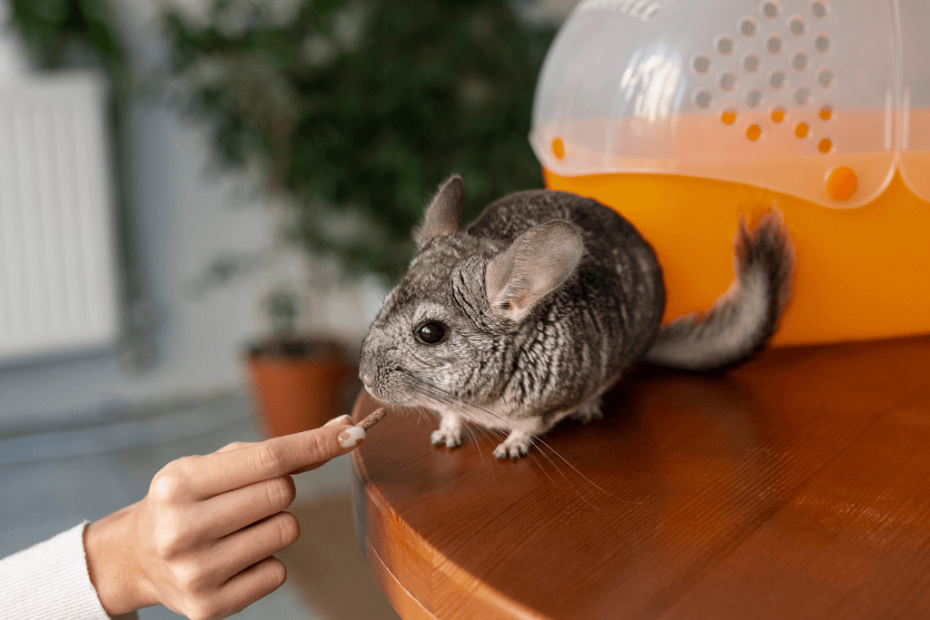Have you ever sneezed or felt congested after cleaning your home or being around rodents? Rodent allergies might be the hidden reason. These allergies occur when your body reacts to proteins in rodent waste.
This includes droppings, urine, saliva, and dander. Even the thinnest exposure can trigger symptoms. They include sneezing, itchy eyes, and asthma attacks.
Rodents are everywhere, from urban apartments to rural homes. Their allergens can settle in the air, on surfaces, or even in your bedding. This makes it tricky to avoid exposure.
Also Read
It’s tough if you live in areas with frequent rodent activity. Some may not realize that their symptoms could be from house mice or pet rodents.
The good news is that understanding rodent allergies is the first step to managing them. This article will explore allergies in Guinea pigs and hamsters. It will cover their causes and how to protect yourself.
Whether you’re wondering, “What do mice eat?” or searching for ways to reduce rodent allergens in your home, you’ll find practical advice here.
Let’s dive into the details so you can breathe easier and live more comfortably.
References
- American Academy of Allergy, Asthma & Immunology (AAAAI): Understanding Indoor Allergies
- Centers for Disease Control and Prevention (CDC): Rodent Control
What Are Rodent Allergies?

Rodent allergies happen when your immune system overreacts to proteins in rodents. These proteins are in their droppings, urine, and saliva. For some, breathing in air contaminated with rodent allergens can trigger reactions. The symptoms can be mild or severe. So, it’s crucial to understand how these allergies develop.
Rodents, like house mice and rats, are common culprits. Pet rodents, such asguinea pigs and hamsters, can cause allergic reactions. Their allergens are tiny, airborne, and spread rapidly, especially in closed spaces. This means exposure can occur even without direct contact with the rodent.
These allergies are not rare. They are common in people in rodent-prone areas. They are also common in those who work in places with frequent rodent exposure. For example, lab workers, pet store staff, and homeowners often report symptoms. They’re dealing with infestations.
The body’s response to rodent allergens is an immune system overreaction. For people with allergies, the body treats harmless proteins as threats. This triggers symptoms such as sneezing, wheezing, coughing, or skin irritation. People with asthma may find that it worsens with rodent allergens.
Understanding rodent allergies is the first step toward managing them. These allergies are more common than many realize. Knowing their causes can help prevent exposure. Next, we’ll detail the symptoms to help you identify if rodents might harm your health.
References
- National Institute of Environmental Health Sciences (NIEHS): Allergens and Health
- American College of Allergy, Asthma & Immunology (ACAAI): Rodent Allergies Overview
Common Symptoms of Rodent Allergies
Rodent allergy symptoms can range from mild irritation to severe breathing problems. Many symptoms appear soon after exposure to rodent droppings, dander, or urine. In some cases, symptoms can escalate quickly. This is especially true for people with asthma or other respiratory conditions.
Respiratory symptoms are the most common. These include sneezing, a runny nose, coughing, and wheezing. Some people may also experience shortness of breath or tightness in the chest. These symptoms can mimic hay fever or seasonal allergies, so they may be overlooked.
Skin reactions are another sign of rodent allergies. Direct contact with rodent allergens can cause rashes, redness, or itchy patches. If allergens settle on clothing or bedding, they can irritate the skin. This can happen without direct contact with a rodent.
For those with asthma, rodent allergens can worsen symptoms significantly. Exposure might lead to more asthma attacks or constant breathlessness. This connection makes managing rodent allergens essential for individuals with pre-existing respiratory conditions.
In rare cases, severe allergic reactions may occur. Symptoms like swelling, difficulty breathing, or anaphylaxis require immediate medical attention. If you suspect a severe response, seek help immediately to avoid complications.
Recognizing these symptoms is critical to finding rodent allergens in your environment. If you experience any of these issues, consider consulting an allergy specialist. A pro can check if rodent allergies are the cause. They can then recommend effective treatments.
References
- American Academy of Allergy, Asthma & Immunology (AAAAI): Allergy Symptoms
- Centers for Disease Control and Prevention (CDC): Rodent-Related Health Risks
Causes and Risk Factors of Rodent Allergies

Rodent allergies develop when your immune system reacts to proteins found in rodents. These proteins, present in rodent droppings, urine, saliva, and dander, are potent allergens. Once airborne, these particles can settle on surfaces or circulate in your environment. This makes exposure hard to avoid.
One major cause of exposure is infestations in homes or workplaces. Rodents are good at hiding. They leave traces, like droppings and fur, that can cause allergies. Even after we clear an infestation, allergens can linger. They can still cause symptoms.
Pet rodents, such as hamsters, guinea pigs, and mice, are another source of allergens. They may seem harmless. But, their cages often have many allergens. Regularly cleaning cages and handling pets can raise allergy risks.
Specific environments also heighten the likelihood of exposure. For example, handling rodents may cause allergies in lab and pet shop workers. Urban residents in rodent-prone areas with poor sanitation are at a higher risk.
Genetics plays a role in rodent allergies as well. If allergies run in your family, you’re more likely to develop a sensitivity to rodent allergens. Those with conditions like asthma or eczema are at a high risk of severe reactions.
Understanding these causes and risk factors is critical to minimizing exposure. To reduce your risk, take proactive steps—seal entry points to prevent infestations. Also, wear protective gear when handling rodents.
References
- National Institute of Environmental Health Sciences (NIEHS): Indoor Allergen Sources
- Asthma and Allergy Foundation of America (AAFA): Allergy Triggers and Prevention
Diagnosis of Rodent Allergies
Identifying rodent allergies starts with understanding your symptoms and environment. A proper diagnosis can determine if rodents cause your allergies. This lets you get the proper treatment and avoid exposure.
The first step is often a detailed discussion with your doctor. They may ask about your living or working conditions. This is especially true if you’ve been in places with rodent droppings or dander. It’s crucial to share when and where your symptoms occur. This is key for an accurate diagnosis.
To confirm the presence of an allergy, your doctor might recommend allergy testing. A standard method is the skin prick test. It involves placing small amounts of rodent allergen on your skin to check for a reaction.
If the area becomes red or swollen, it indicates an allergy. Another option is a blood test. It measures the immune system’s response to specific allergens.
Doctors may sometimes need to conduct extra testing to rule out other conditions. For instance, asthma or dust allergies can cause similar symptoms. A thorough evaluation ensures an accurate, personalized diagnosis.
Recognizing the signs of rodent allergies is essential for your health. Untreated rodent allergens can worsen over time. They can cause chronic respiratory issues. The best way to address this problem is to consult a healthcare professional.
References
- American College of Allergy, Asthma & Immunology (ACAAI): Allergy Testing
- National Health Service (NHS): Diagnosing Allergies
Treatment and Management of Rodent Allergies

Managing rodent allergies involves a combination of treatment and prevention strategies. Medical treatments can help with symptoms. But to find long-term relief, you must reduce exposure to allergens.
For immediate symptom relief, antihistamines are commonly recommended. These medications help reduce sneezing, a runny nose, and itching. If nasal congestion is severe, your doctor may suggest decongestants. They can clear your airways. Corticosteroid sprays can relieve nasal inflammation. They work for persistent symptoms.
If symptoms are difficult to control, your doctor might consider immunotherapy. This treatment involves getting small doses of allergens over time. It helps your immune system build tolerance. Immunotherapy requires regular sessions. It can significantly reduce sensitivity to rodent allergens.
Also, for medical treatment, controlling exposure is crucial. Start by rodent-proofing your home. Seal any cracks or holes that allow rodents inside—store food in airtight containers. Regular cleaning is also essential. Vacuum carpets and upholstery often. Use a vacuum with a HEPA filter. It traps allergens well.
If you own pet rodents, take extra precautions. Clean their cages regularly and wear gloves when handling them. Use air purifiers in the room where they are kept to minimize airborne allergens. Washing your hands after contact with rodents is also a simple but effective.
For those in high-risk workplaces, protective gear is essential. Masks and gloves can block allergens. This reduces allergy symptoms. Employers should ensure that ventilation systems are in place to limit airborne particles.
Combining medical treatments with prevention can manage rodent allergies. It will improve your quality of life. If symptoms persist despite these efforts, consult a specialist for tailored advice.
References
- Mayo Clinic: Allergy Treatments
- Asthma and Allergy Foundation of America (AAFA): Managing Allergies
Preventing Rodent Allergies
Prevention is the most effective way to reduce the impact of rodent allergies. Cut contact with allergens in your environment. It will protect you from triggering symptoms. If you have an infestation or want to keep out rodents, proactive steps can help.
The first step is to rodent-proof your home. Inspect your walls, windows, and doors for small openings where rodents might enter. Seal these gaps using steel wool or caulk, as rodents cannot chew through these materials.
Maintaining a clean living space holds equal importance. Crumbs, open food containers, and garbage are common attractants for rodents. Store food in airtight containers and dispose of the trash regularly.
Using air purifiers with HEPA filters can help capture airborne rodent allergens. These filters trap tiny particles, like dander and urine proteins, that may be in your home. Regular vacuuming with a HEPA vacuum can remove allergens from carpets and upholstery.
If you own pet rodents, special care is necessary to prevent allergens from building up. Clean their cages at least once a week, preferably outdoors. This avoids spreading allergens indoors. Wear gloves and a mask while cleaning to limit direct exposure to allergens. Placing the cage in a well-ventilated area away from bedrooms can also reduce the risk.
Wear protective clothing, masks, and gloves in labs when exposed to unavoidable . They can help. Employers should ensure proper ventilation and cleaning protocols to keep allergen levels low. Regular breaks from areas with high rodent activity can also help reduce exposure.
Finally, consider pest control services if you suspect an infestation. Professional exterminators can remove rodents safely. They can also advise on preventing future issues. Regular cleaning and allergen-reducing methods can significantly lower your risk of rodent allergies.
References
- Centers for Disease Control and Prevention (CDC): Rodent Control Tips
- American Lung Association: Preventing Indoor Allergens
Rodent Allergies in Pet Owners

Many pet owners love their rodents, like hamsters and guinea pigs. However, these pets can cause rodent allergies, even in non-allergic people. These allergies occur due to exposure to allergens in the pets’ droppings, urine, or dander. These can accumulate in their cages and nearby areas.
Pet owners often start sneezing with a stuffy nose or watery eyes. This is especially true after cleaning cages or handling rodents. Prolonged exposure can worsen these symptoms. It may cause coughing, skin irritation, or asthma flare-ups. If you notice these symptoms after being with your pet, it may not indicate a rodent allergy.
Managing rodent allergies while keeping your pet involves careful planning. Start by designating a specific area for your pet that is easy to clean and well-ventilated. Avoid keeping its cage in bedrooms or areas where you spend most of your time. This limits prolonged exposure to allergens in your living space.
Cleaning the cage regularly is essential, but it should be done with precautions. Always wear gloves and a mask while cleaning. Dispose of waste carefully to prevent allergens from becoming airborne. Use HEPA filters in rooms where your pet is kept to capture allergens that may circulate in the air.
If symptoms persist, consult an allergy specialist. Treatments like antihistamines or nasal sprays can help control mild symptoms. Immunotherapy may reduce your sensitivity to rodent allergens for severe cases over time. Your doctor can tell you. Are lifestyle changes enough? Or is rehoming your pet necessary for your health?
Loving your pet doesn’t mean you have to suffer. With good hygiene and medical advice, many people manage their rodent allergies. They keep their furry friends.
References
- American Veterinary Medical Association (AVMA): Pets and Allergies
- Mayo Clinic: Allergy Management
The Connection Between Rodent Allergies and Urban Living
Living in urban areas comes with unique challenges, and rodent allergies are one of them. Cities often have many rodents. This is due to dense housing, food waste, and poor sanitation. Urban residents are more likely to find rodent droppings, dander, and other allergens. These can trigger allergic reactions.
Urban areas often have pest infestations. This is common in older buildings or neighborhoods with poor pest control. Rodents seek warm, food-rich places. Once they settle in, their allergens spread easily. Airborne particles from their urine or dander can linger in vents. This worsens air quality.
Public health plays a significant role in managing rodent exposure. Municipalities often implement rodent control programs, but individual efforts are as important. To reduce allergens, residents should seal cracks, clean, and dispose of trash. This will deter rodents.
Urban dwellers with asthma or other respiratory conditions are especially vulnerable. Rodent allergens in cities can worsen symptoms. They make it harder to manage existing conditions. Using HEPA filters or a pest control expert can help in these cases.
Knowing the risks of rodent allergies in cities is key to protecting your health. City living increases exposure to allergens. But we can reduce them. We can improve hygiene, control infestations, and use protective measures. These steps will improve indoor air quality.
References
- Centers for Disease Control and Prevention (CDC): Urban Rodent Control
- Environmental Protection Agency (EPA): Indoor Air Quality
Frequently Asked Questions About Rodent Allergies

1. What are the common symptoms of rodent allergies?
Symptoms include sneezing, coughing, a runny nose, itchy or watery eyes, and skin rashes. In severe cases, rodent allergens can worsen asthma or lead to breathing difficulties.
2. Can rodent allergies develop suddenly?
Yes, rodent allergies can develop over time with repeated exposure. People near rodents often develop symptoms over time.
3. Are rodent allergies more common in urban areas?
Yes, urban areas expose people to more rodents. This is due to high population density, waste, and shared living spaces. This makes urban residents more susceptible to rodent allergens.
4. How can I confirm whether I have rodent allergies?
Consult an allergist for a diagnosis. Tests, like skin pricks or blood tests, can check for rodent allergens.
5. Can rodent allergies be prevented?
Yes, prevention involves minimizing exposure to allergens. Seal your home’s entry points. Clean regularly with HEPA filters. Maintain hygiene around pets and in rodent-prone areas.
6. What should I do if I react severely to rodent allergens?
If you have severe symptoms like swelling or trouble breathing, get help immediately. Long-term management may include allergen immunotherapy or medications like antihistamines and corticosteroids.
7. Can owning pet rodents cause allergies?
Yes, pet rodents, like hamsters and guinea pigs, can cause allergies. Their dander, urine, and droppings contain allergens. Proper cage cleaning, air filtration, and personal hygiene can reduce exposure.
References
- American College of Allergy, Asthma & Immunology (ACAAI): Allergy FAQ
- Mayo Clinic: Managing Severe Allergies
Conclusion
Rodent allergies can be overwhelming. But, knowing the causes and symptoms is the first step to managing them. These allergies often come from rodent droppings, urine, dander, or saliva proteins. So, both prevention and treatment are essential.
Identify symptoms early. Then, consult a healthcare professional. You can create a plan tailored to your needs. Antihistamines and immunotherapy can relieve symptoms. Preventive measures can also help. Seal entry points, use HEPA filters, and keep things clean to reduce allergens.
Pet owners can manage allergies with extra care. They can keep their furry friends. Regular cage cleaning, protective gear, and good ventilation make a big difference. In cities, we must tackle rodent infestations and improve sanitation. This is key to reducing exposure.
Achieving comfort while living with rodent allergies is possible. To protect your home and health, follow these steps. Combine medical advice with lifestyle changes. Then, take proactive steps to prevent problems. If symptoms persist or worsen, seek professional help for lasting solutions.
References
- Asthma and Allergy Foundation of America (AAFA): Living with Allergies
- Centers for Disease Control and Prevention (CDC): Rodent-Related Allergies and Healthasthma flare-ups


Pingback: Understanding Pet Allergies: Comprehensive Guide to Causes, Symptoms, and Solutions - Pawspera